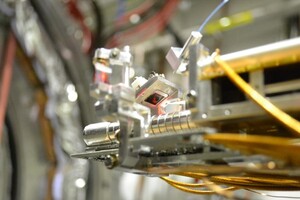New Marie Curie Innovative Training Network on Antimatter Research announced
The AVA project will allow cutting edge research and promote training innovations
AVA (Accelerators Validating Antimatter physics) is a new European research and training network between universities, research centres and industry. Within the project a cohort of 15 Fellows will be employed to carry out cutting edge research and follow a highly innovative training program. The project was selected for funding in one of the European Union’s most competitive funding schemes and will benefit from almost 4 M€ of funding over its 4-year duration. AVA targets new scientific and technical developments in antimatter research and aims at boosting the career prospects of its Fellows.
Antimatter is a rather exotic material composed of antiparticles, which have the same mass as particles of ordinary matter but opposite charge. Collisions between particles and antiparticles lead to the annihilation of both, giving rise to a release of energy, proportional to the total matter and antimatter mass. Low energy antiprotons are particles that are highly desirable for the investigation of a number of very basic questions on the fundamental laws of physics.
Prof Carsten Welsch, who is Head of the Department of Physics at Liverpool University and Coordinator of AVA said: “Antimatter experiments are at the cutting edge of science. They are, however, very difficult to realize and have been limited by the performance of the only existing facility in the world, the Antiproton Decelerator at CERN. This year the new Extra Low Energy Antiproton ring (ELENA) is being commissioned at CERN and will be a critical upgrade to this unique facility. This will significantly enhance the beam quality and enable new experiments. In addition, there are exciting long-term prospects through opportunities a future low energy antimatter facility could provide as part of the FAIR research centre in Germany.”

Antihydrogen production region in the AEgIS experiment.
Image courtesy of Michael Doser, CERN.
Within AVA, the project partners will pursue a closely connected R&D program across three scientific work packages. The first one focuses on facility design and optimization, addressing beam life time and stability issues in lowest energy storage rings, as well as beam cooling, deceleration and extraction processes. Work package 2 addresses the design, development and testing of novel beam diagnostics and in particular the establishment of a dedicated instrumentation and detector test stand, to fully determine the characteristics of an antiproton beam. Finally, novel low energy antimatter experiments will be carried out through involving beyond state-of-the-art beam handling, storing and analysis techniques.
SMI is participating in AVA with its activities to measure the ground-state hyperfine splitting of hydrogen and antihydrogen at the Antiproton Decelerator of CERN, which is supported by the ERC Advanced Grant project “HbarHFS” of SMI director E. Widmann. A measurement of this quantity in antihydrogen would constitute one of the most sensitive tests of the fundamental CPT symmetry. The subject of the AVA Ph.D. project will be to extend the existing Rabi-type setup by Ramsey’s method of separated oscillatory fields to increase the precision by about an order of magnitude. The development and demonstration will be done using a polarized beam of hydrogen, after which the results should be applied to design an experiment to perform similar measurements with antihydrogen.
A structured combination of local and network-wide trainings will also be offered within AVA. This includes courses at the different host institutions, alongside network-wide trainings which will be made available to the wider scientific community. The project comprises a lot of the European expertise in this research area and involves 4 universities, 8 national and international research centres with 13 partners from industry.
AVA is offering 15 Fellowships to talented, energetic, highly motivated early career researchers that will be employed by the different project partners across Europe. Possibilities for enrolling into a PhD programme exist. Each researcher will benefit from a wide ranging training programme that will take advantage of both local and network-wide activities. Excellent salaries will be offered. The application deadline is 6th January 2017.
More information about the project can be found on the project home page:
www.ava-project.eu

